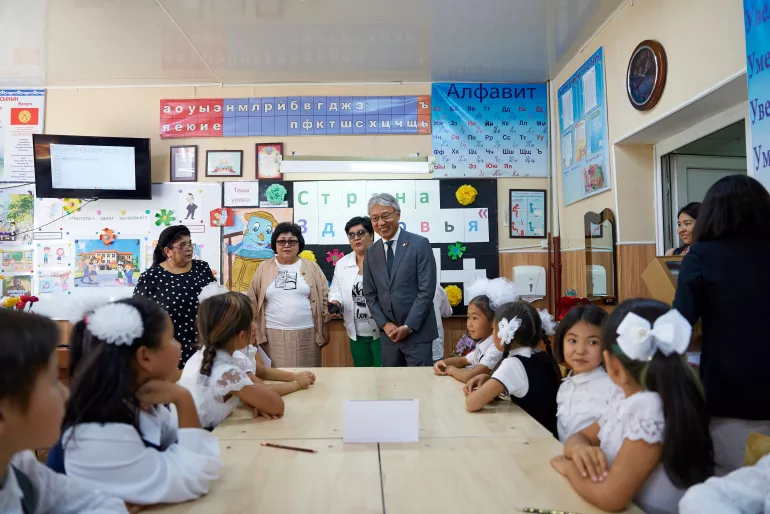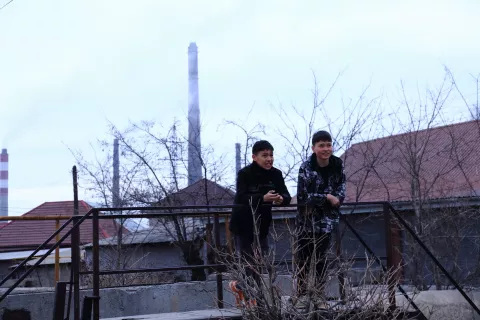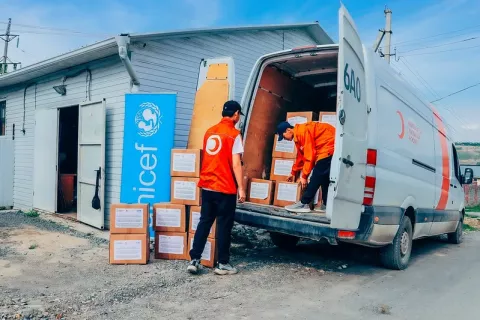UNICEF Equips 100 Computer Classrooms and Provides Hygiene and Sanitary Supplies to Schools in Kyrgyzstan to Prevent Further Impact of COVID-19
With the contribution of US 2.7 million from the Government of Japan, UNICEF supports the Government of the Kyrgyz Republic in ensuring quality education for children affected by COVID-19.

BISHKEK, 1 September 2022 – Today, during the annual “Welcome to School” event at school #88 named after K. Bobulov, Mr Ulanbek Mambetakunov, the Deputy Minister of Education and Science, Mr Shigeki Maeda, Ambassador Extraordinary and Plenipotentiary of Japan, and Mr Tomoya Sonoda, acting UNICEF Deputy Representative in the Kyrgyz Republic participated in the traditional academic year beginning event and opened a newly equipped IT-room.
At the opening of the IT class, Mr Ulanbek Mambetakunov, the Deputy Minister of Education and Science said: “We hope to hear in the future that graduates of the 88th school have become famous programmers and outstanding specialists”.
Mr Shigeki Maeda, the Ambassador Extraordinary and Plenipotentiary of Japan to the Kyrgyz Republic noted: “The Government of Japan and UNICEF share the common value that education in a safe environment for all children is the universal right. This initiative has two components: procurement of sanitary equipment to schools to ensure a safe and hygiene learning environment, and a catch-up learning program for 20,000 children who were not able to participate in online classes during the school shutdown. This will minimize the learning gap and improve education outcomes.”
School #88 in Bishkek is one of 100 schools across the country which will receive computer equipment for the total sum of 600,000 USD and one of 460 schools to receive hygiene and sanitary supplies, such as thermometers, hand dryers, sanitizers and soaps to prevent the spread of COVID-19 for the sum of 800,000 USD. The targeted schools selected in new settlements of Bishkek and Osh and rural areas were identified by the Ministry of Education and Science as key points to enhance digital learning and learning programmes on numeracy and literacy.
Addressing the participants of the signing ceremony, acting UNICEF Deputy Representative in the Kyrgyz Republic Mr Tomoya Sonoda noted: “Even before the pandemic, children’s learning outcomes were challenging in Kyrgyzstan. Whilst living with COVID-19, we need to keep schools safe and open to avert a learning crisis and put children back on the learning track. The partnership between the Government of Japan and UNICEF will strengthen our education programme to ensure that all children have access to quality learning opportunities.”
The project on ensuring quality education of children affected by COVID-19 was designed to support the Ministry of Education and Science to mitigate the impact of COVID-19 on the education system. The project duration is until August 2024 and will contribute to the achievement of Sustainable Development Goal (SDG) 4: Ensure inclusive and equitable quality education and promote lifelong learning opportunities for all.
Media contacts
About UNICEF
UNICEF promotes the rights and wellbeing of every child, in everything we do. Together with our partners, we work in 190 countries and territories to translate that commitment into practical action, focusing special effort on reaching the most vulnerable and excluded children, to the benefit of all children, everywhere.
For more information about UNICEF and its work for children, visit www.unicef.org.




